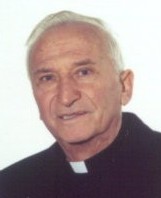Daniel Comboni
Comboni Missionaries
Institutional area
Other links
Newsletter
In Pace Christi
De Bernardi Giovanni
Fr. Giovanni De Bernardi was born at Busto Arsizio, in the province of Milano, on 26 November, 1924. After entering the diocesan seminary of Milano, he was admitted to the novitiate at Venegono in August, 1942. Two years later he took first vows. He began his scholasticate at Rebbio and was afterwards sent to Verona. In 1947, he was sent to Cincinnati, USA, to complete his theological studies. He was ordained priest in Cincinnati on 25 March, 1950. He then went to London for six months to get the Cambridge Certificate, a requirement to enter Uganda, and spent a further six months in ministry at Rebbio, while waiting for his entry visa.
In October, 1951, he left for Uganda where he stayed until the last months of his long life. He lived through many events in the history of Uganda, events of hope, pain and sadness under Idi Amin Dada, Milton Obote, Yoweri Museweni and the senseless violence of the Lord’s Resistance Army (LRA) led by Joseph Kony. He spent the first eleven years working in the missions of North Uganda: Morulem (Karamoja), Angal (West Nile), Aber (Lira) and Padibe (Gulu). Those missions of the North were his “first love” and he always had a special regard for its people, even when he no longer worked among them.
In 1962 he was moved to work among the Baganda, in South Uganda. There the Comboni Missionaries, following the Missionaries of Africa (White Fathers), were trying to continue their style of evangelisation and organisation. Fr. Giovanni always collaborated with the local Church trying to encourage and keep alive in it the same missionary spirit and passion for evangelisation that led the Combonis to Uganda. He still had at heart the memory of his work in the North in the manner of Comboni and Fr. Antonio Vignato. He took part in the life of a Church that grew to maturity. He was there in 1966 when the first Archbishop of Kampala, Mgr. Emmanuel Kiwanuka Nsubuga, was appointed. He later accompanied the archbishop to Italy to meet the families of the missionaries working in the Ugandan Archdiocese.
“Fr. Giovanni – Fr. Umberto Pescantini recalls – was known to all in Uganda as Fr. Giannino. He spent the first eleven years among the Luo. He later went to Kasaala in the sixties and remained among the Baganda for the rest of his missionary life, over half a century. He was parish priest at Katikamu for five years and a further 18 at Lweza. He spent the remainder of the time in Kasaala, as an elder co-operator to various confreres: Fr. Fulvio Cristoforetti, Fr. Giorgio Previdi and others. He loved the priestly ministry and was happy to stay with the people and spent much time doing domestic repairs. In the course of the years he also built important edifices such as the shrine to Our Lady on a hill at Lweza and the large parish church at Kasana-Luweero that soon became the cathedral church of the new diocese. He was a fund-raiser, kept in constant postal contact with benefactors and kept his projects to himself. He was a simple man with no great love for reading. His homilies were rather spare and repetitive, but never omitted mention of Our Lady. During the time we spent together at Kasaala, from 1992 to 1995, he would go once a week to the Shrine of Our Lady he had built at Lweza to celebrate Mass there. He said and hoped that it would one day become a ‘national’ Shrine. He always travelled with his old Fiat 850, a vintage car that only he, being a good mechanic, could keep running. Sometimes a policeman or businessman would offer to buy it from him but Fr. Giannino never parted with it. Of course, he travelled very slowly and this sometimes caused traffic problems! We lived like good friends at Kasaala and we worked together in the parish ministry. In those times, the guerrilla war had ended and people were returning to the area so we administered the sacraments on a grand scale: baptisms, confirmations, marriages and confessions. The missionary had no time to rest and the people were being very generous, providing all sorts of food.”.
In 2013, after almost 62 years in Uganda, Fr. Giovanni went back to Italy for treatment in Milan. He died there on 2 November that same year. In his funeral homily, Fr. Lino Spezia said that Fr. Giovanni, having spent more than 60 years in Uganda, would have liked to have died in “his native land”. He had already chosen his burial place but “God’s plan was different. Fr. Giovanni leaves us a great tree (of faith) in whose shade many may rest a while before continuing their journey. He leaves us the testimony of having been fully conscious even in his last days, never complaining to God but finding in Him a true answer as to how to ‘resemble’ Him more and never to complain even to those around him. He had a great sense of his priesthood. He was a man who belonged to God. For him, prayer came first, then all the rest”.
Da Mccj Bulletin n. 258 suppl. In Memoriam, gennaio 2014, pp. 126-130.

